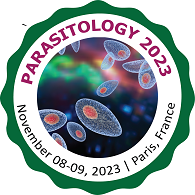Blood Parasites
Some parasites can be bloodborne. This means:
- the parasite can be found in the bloodstream of infected people; and
- the parasite might be spread to other people through exposure to an infected person's blood (for example, by blood transfusion or by sharing needles or syringes contaminated with blood).
Examples of parasitic diseases that can be bloodborne include African trypanosomiasis, babesiosis, Chagas disease, leishmaniasis, malaria, and toxoplasmosis. In nature, many bloodborne parasites are spread by insects (vectors), so they are also referred to as vector-borne diseases. Toxoplasma gondii is not transmitted by an insect (vector).
Related Conference of Blood Parasites
March 09-10, 2026
21th International Conference on Allergic Diseases and Clinical Immunology
Singapore City, Singapore
April 16-17, 2026
13th World Congress and Exhibition on Antibiotics and Antibiotic Resistance
London, UK
Blood Parasites Conference Speakers
Recommended Sessions
- Advances in Parasite Medications
- Approaches: Parasitic Disease Control
- Blood Parasites
- Brain Parasites
- Experimental Immunoparasitology
- Eye Parasites
- Fish Parasitic Diseases
- Malaria Research
- Medical Parasitology
- Parasite Remedies
- Parasite Treatments
- Parasitic Worms
- Parasitology
- Pathogenesis and Immunity
- Skin Parasites
- Stool Parasites
- Structural and Molecular Parasitology
- Ticks and Tick-borne Pathogens in Tropical Veterinary Medicine
- Tropical Medicine Parasitology
- Vector-Borne Viral Diseases
- Veterinary Parasitology
- Water Parasites
Related Journals
Are you interested in
- Adaptive Immunity, Memory Formation & T-Cell Engineering - European Immunology 2026 (France)
- Allergy, Hypersensitivity & Immune Tolerance - Immunology 2026 (France)
- Allergy, Hypersensitivity & Immune Tolerance Strategies - European Immunology 2026 (France)
- Antibiotic Prophylaxis - Antibiotics 2026 (UK)
- Antibiotic Resistance: Opportunities and Challenges - Antibiotics 2026 (UK)
- Antibiotic-resistant Bacterial infections - Antibiotics 2026 (UK)
- Antibiotics - Antibiotics 2026 (UK)
- Antibiotics for Various Diseases and Infections - Antibiotics 2026 (UK)
- Antibiotics: In Pregnancy and Lactation - Antibiotics 2026 (UK)
- Antimicrobial Peptides - Antibiotics 2026 (UK)
- Antimicrobial Therapy - Antibiotics 2026 (UK)
- Autoimmune & Inflammatory Disorders - Immunology 2026 (France)
- Autoimmunity Mechanisms & Precision Immunoregulation - European Immunology 2026 (France)
- Cancer Immunology & Tumor Microenvironment - Immunology 2026 (France)
- Cellular Signaling & Cell Fate Determination - Immunology 2026 (France)
- Clinical and Translational Immunology - Immunology 2026 (France)
- Clinical Trials of Antibiotics - Antibiotics 2026 (UK)
- Computational Immunology, AI Modeling & Immune System Simulation - European Immunology 2026 (France)
- Current Research in Antibiotic Resistance - Antibiotics 2026 (UK)
- Cytokine Signaling Networks & Immune Modulation - European Immunology 2026 (France)
- Developing Alternatives to Antibiotics - Antibiotics 2026 (UK)
- Drug Discovery and Novel Delivery Technologies - Antibiotics 2026 (UK)
- Immune Cell Reprogramming & Gene-Edited Immunotherapies - European Immunology 2026 (France)
- Immunogenetics & Epigenetic Regulation - Immunology 2026 (France)
- Immunology & Vaccines - Antibiotics 2026 (UK)
- Immunometabolism - Immunology 2026 (France)
- Immunometabolism & Cellular Energy Dynamics - European Immunology 2026 (France)
- Immunotherapy & Immune Modulation - Immunology 2026 (France)
- Infectious Diseases - Antibiotics 2026 (UK)
- Infectious Diseases & Host–Pathogen Interactions - Immunology 2026 (France)
- Inflammation Biology & Chronic Immune Disorders - European Immunology 2026 (France)
- Innate and Adaptive Immune Mechanisms - Immunology 2026 (France)
- Innate Immune Sensors, Pattern Recognition & Host Defense - European Immunology 2026 (France)
- Innovations in Cell Biology & Imaging Technologies - Immunology 2026 (France)
- Mechanisms and Evolution of Antibiotic Resistance - Antibiotics 2026 (UK)
- Micro Organisms in Recent Drug Discovery - Antibiotics 2026 (UK)
- Microbiome–Immune Axis & Host Interaction Pathways - European Immunology 2026 (France)
- Microorganisms Producing Antibiotics - Antibiotics 2026 (UK)
- Modern Antibiotics for Various Diseases and Infections - Antibiotics 2026 (UK)
- Molecular & Cellular Immunology - Immunology 2026 (France)
- Mucosal Immunity & Barrier Protection Mechanisms - European Immunology 2026 (France)
- Nanotechnology-Enabled Immune Delivery Systems - European Immunology 2026 (France)
- Neuroimmunology & Brain–Immune Interactions - Immunology 2026 (France)
- New antibiotics and non-antibiotic approaches - Antibiotics 2026 (UK)
- Next-Generation Vaccines & Antigen Engineering - European Immunology 2026 (France)
- Pharmacokinetics and Pharmacodynamics of Antimicrobial Drugs - Antibiotics 2026 (UK)
- Pharmacology & Toxicology - Antibiotics 2026 (UK)
- Prevention and Control of Antibiotic Resistance - Antibiotics 2026 (UK)
- Stem Cells & Regenerative Immunology - Immunology 2026 (France)
- The Next Generation Approach of Antibiotics - Antibiotics 2026 (UK)
- Tumor Immunology & Personalized Cancer Immunotherapies - European Immunology 2026 (France)
- Vaccines & Vaccine Technology - Immunology 2026 (France)
- Viral Immunology, Emerging Pathogens & Host Response - European Immunology 2026 (France)


